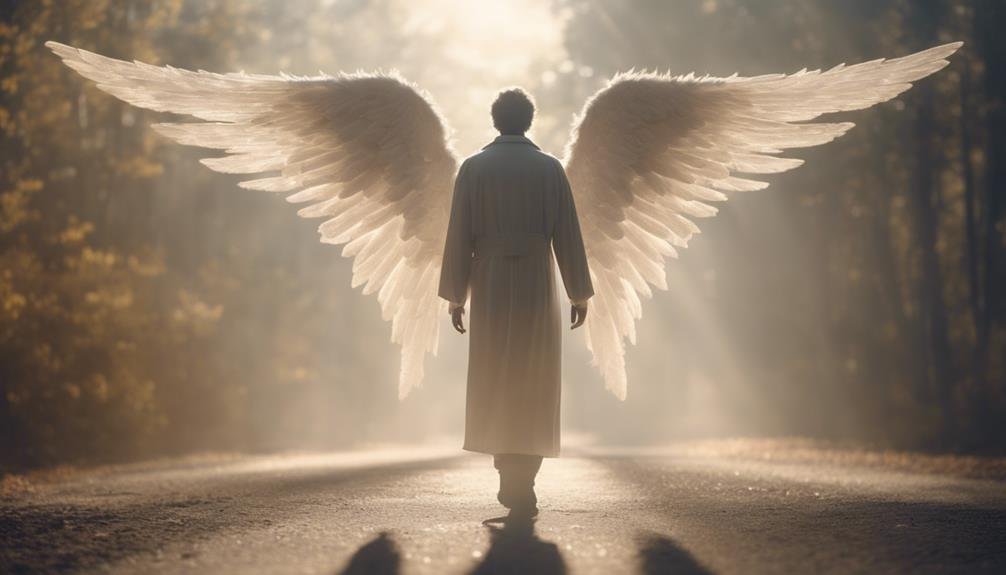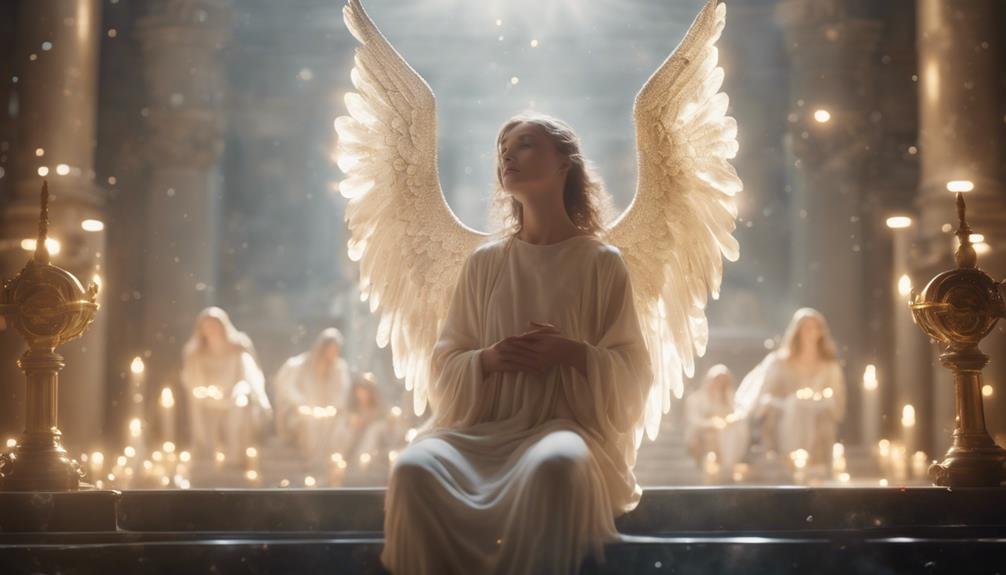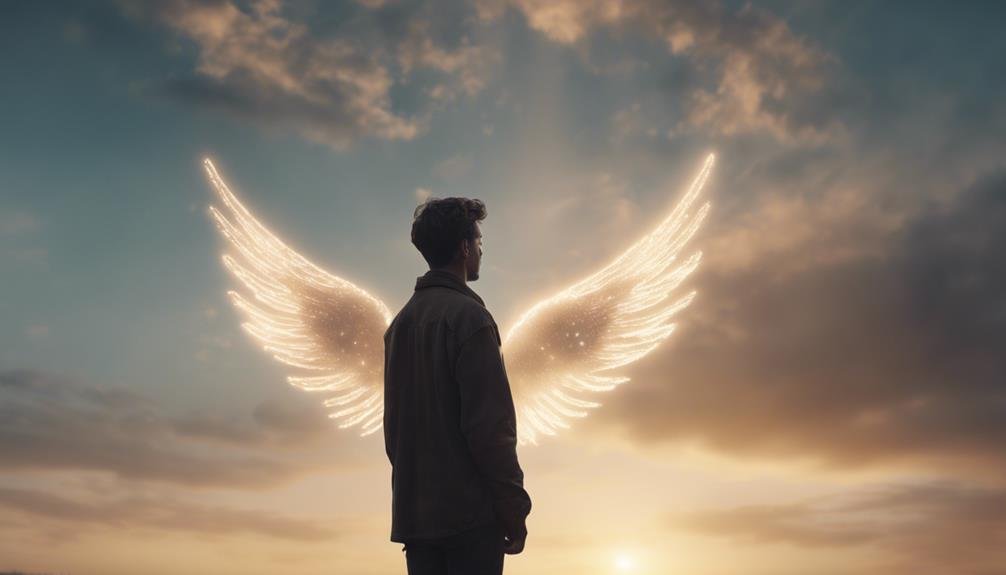When you think about free will, you might wonder how it applies differently to angels and humans. Unlike humans, angels’ choices are starkly defined by obedience or rebellion, without the moral gray areas that often cloud human decisions. Humans wrestle with ethical dilemmas influenced by their fallen nature, making their moral landscape far more intricate. Angels operate primarily to fulfill divine purposes, while humans navigate a broader spectrum of choices impacting their spiritual journey. This distinction raises intriguing questions about the nature of free will across these two domains, inviting you to explore the deeper theological implications.
Key Takeaways
- Angels exercise free will primarily in choosing obedience or rebellion without internal moral struggles.
- Human free will is influenced by a sinful nature and involves navigating complex moral decisions.
- Angels’ obedience to God is pure and unclouded by inherent sin, unlike humans.
- Fallen angels face eternal consequences without redemption, whereas humans have the opportunity for redemption.
- Angels’ free will aligns with their divine roles, while human free will impacts their spiritual and moral journey.
Definition of Free Will

Free will is the ability to make choices without external coercion, making individuals accountable for their actions. You have the power to choose between right and wrong, love and indifference, or selflessness and selfishness. This concept isn’t exclusive to humans; angels have free will too.
However, unlike the angels, you possess a sinful nature that complicates your decision-making process. Angels are spiritual beings who also exercise free will, but their nature is fundamentally different. They don’t struggle with sin the way humans do. Their choices are made from a place of spiritual clarity, unclouded by the moral struggles that humans face.
This distinction is important because it highlights the different ways free will manifests in angels and humans. Your choices, influenced by your human nature, have temporal and eternal consequences. Similarly, the choices angels make also have significant repercussions, but their spiritual essence shapes these outcomes differently.
Angelic Nature and Purpose
Angels, created with a purpose by God, serve as messengers, warriors, and worshippers, fulfilling divine will without the burden of a sinful nature. They’re designed to act in accordance with God’s commands and serve specific roles in the divine plan. Angels are free to make choices, but unlike humans, they don’t have an inherent inclination toward sin. Their free will means they can choose obedience or rebellion, as shown by the existence of fallen angels.
The concept of fallen angels comes from those who used their free will to follow Satan rather than God. This choice had significant and eternal consequences, demonstrating that while angels can act independently, their decisions are weighty and irreversible. Fallen angels serve as a stark contrast to those who remain faithful, showcasing the gravity of their free will.
You can see that angels’ purpose and their exercise of free will are tightly interwoven. They’re not merely passive beings but active participants in the cosmic order. Their nature allows them to fulfill divine mandates effectively, but it also means that their choices shape their eternal destiny, highlighting the profound responsibility of their free will.
Human Free Will

Unlike angels, humans possess the unique ability to exercise free will in their daily lives, making choices that shape their moral and spiritual journey. This free will allows you to make decisions without coercion or predetermined outcomes, giving you the power to choose between good and evil. This capability differentiates humans from angels in significant ways.
Your free will means you’re accountable for your actions and decisions. Every choice you make carries consequences that impact your life both now and in eternity. For example, choosing to act with kindness and love can lead to positive outcomes and personal growth, while harmful actions can result in negative repercussions.
The ability to experience love and develop personal responsibility is deeply tied to free will. Without it, genuine love and moral development wouldn’t be possible. According to Scripture, this capacity for choice is a fundamental aspect of human nature, setting you apart from angels who’ve different roles and limitations.
In essence, the interplay between free will and its consequences underscores the profound responsibility you carry in your actions, highlighting the distinct ways angels and humans navigate their existence.
Biblical Perspectives on Angels
In the Bible, angels are depicted as powerful beings who serve as messengers and servants of God, fulfilling divine missions without the burden of a sinful nature. Unlike humans, they do not experience an internal struggle with sin. However, angels do have free will, allowing them to choose between following God or rebelling against Him. This choice is evident in the biblical account of Lucifer and his followers, who chose to defy God and were cast out of heaven.
The nature of angels is fundamentally different from that of humans. Angels were created as holy beings, free from the inherent sinful nature that humans possess from birth. This distinction means that angels can worship and serve God without the temptation to sin, making their obedience to God’s will pure and untainted.
To better understand the differences between angels and humans, consider the following comparison:
| Aspect | Angels According to the Bible | Humans According to the Bible |
|---|---|---|
| Free Will | Yes | Yes |
| Sinful Nature | No | Yes |
| Created as Holy | Yes | No |
| Ability to Rebel | Yes | Yes |
| Internal Sin Struggle | No | Yes |
Understanding these differences helps clarify how angels operate in divine service, distinct from the human experience of free will and sin.
Role of Angels in Theology

In theological texts, you’ll find that angels are often viewed as divine messengers whose main purpose is to carry out God’s commands, reflecting their alignment with divine will.
Understanding their hierarchical structure helps you grasp how different angels serve specific roles within this framework.
Divine Messengers’ Purpose
Angels serve as divine messengers, faithfully delivering God’s directives to humanity. In theology, angels in heaven are seen as holy beings who carry out God’s will with unwavering obedience. Unlike humans, who are created in the image of God and have the capacity for sin, angels are created to serve God’s people without the propensity to rebel against divine commands.
As God’s messengers, angels have specific roles and tasks. They bring messages of comfort, warning, guidance, and revelation to humanity. For example, in biblical accounts, angels announced the birth of Jesus, provided guidance to prophets, and offered protection to believers. Their purpose is centered on fulfilling God’s plans and ensuring His will is communicated and executed on earth.
Humans, on the other hand, are called to make choices that impact their lives and eternity. While angels act in complete obedience, humans often struggle with sin and disobedience but have the opportunity for redemption through faith in Jesus Christ.
This difference underscores the unique yet complementary roles of angels and humans within God’s divine framework. Angels’ unwavering obedience highlights their role as instruments of God’s will, while humans’ journey involves free will and the potential for redemption.
Hierarchical Structure Explained
Throughout history, theologians have meticulously outlined the hierarchical structure of angels, revealing their distinct roles and ranks within the divine order. This structure isn’t just about their positions but also their specific functions and exercise of free will. Unlike humans, angels are created with inherent holiness and don’t possess a sinful nature, which positions them uniquely in God’s plan.
In theological studies, the hierarchical structure of angels is typically divided into several orders. Here are four notable ones to give you a clearer picture:
- Seraphim – These are the highest order of angels, known for their burning love and closeness to God, often depicted as guardians of His throne.
- Cherubim – Positioned next in the hierarchy, cherubim are considered protectors of divine mysteries and possess immense knowledge.
- Archangels – These angels act as God’s chief messengers and warriors, often delivering important divine decrees to humans.
- Guardian Angels – Assigned to protect and guide individual humans, they play a more personal and direct role in human lives.
While angels and humans both have free will, the hierarchical structure of angels highlights their specialized, sinless roles within the divine order, contrasting with the human experience of temptation and redemption.
The Fall of Satan
When Satan, once known as Lucifer, chose to rebel against God out of pride, he set a profound example of free will among angelic beings. This rebellion wasn’t a result of a sinful nature, as angels were created holy. Instead, it indicates that angels, despite their initial purity, possess the capability to choose against God’s will. One-third of the angels followed Satan, showcasing their own exercise of free will.
The Fall of Satan underscores the distinctions between angelic and human choices. Humans, as described in Matthew, are born with a sin nature, which influences their decisions. Angels, however, made their choices from a position of holiness. This divergence highlights the unique attributes of angelic free will.
Here’s a quick comparison:
| Aspect | Angels Before the Fall | Humans |
|---|---|---|
| Initial State | Holy | Born with a sin nature |
| Source of Rebellion | Free will, pride | Sin nature, temptation |
| Consequence of Rebellion | Eternal separation from God | Redemption possible through Christ |
| Example | Lucifer’s rebellion | Adam and Eve’s disobedience |
Understanding Satan’s fall helps you grasp the profound implications of free will in angelic beings, setting a stark contrast with human experiences.
Free Will in Fallen Angels

Fallen angels, having exercised their free will to rebel, now face eternal separation from God. These angels, led by Satan, chose to sin against their Creator, resulting in their expulsion from heaven. This act of rebellion wasn’t a spur-of-the-moment decision but a deliberate choice to oppose God’s authority.
When you consider the consequences of the fallen angels’ actions, a clear picture emerges:
- Rebellion: One-third of the angels followed Satan, using their free will to turn against God.
- Expulsion: This rebellion led to their immediate expulsion from heaven, forever altering their existence.
- Separation: The fallen angels’ choice to sin means they’re eternally separated from God, cut off from His presence.
- Eternal Consequences: Their misuse of free will has condemned them to a state of eternal damnation, with no hope of redemption.
These fallen angels serve as a stark reminder of the weight and consequences that come with the gift of free will. Unlike holy angels, who use their free will to serve and obey, these rebels chose a path of sin, leading to their eternal downfall.
Obedience of Angels
Unlike humans, angels exercise their free will without the burden of a sinful nature, choosing to obey God’s commands out of pure devotion. Their obedience stems from a profound alignment with God’s divine will, free from the internal conflicts that humans face.
While humans wrestle with sinful desires, angels naturally incline towards holiness, making their choice to serve God an expression of their true nature.
Angels demonstrate their free will by willingly carrying out God’s will. They don’t struggle with the temptation to sin, which allows them to focus entirely on their divine missions. This unwavering obedience showcases their dedication and loyalty to God.
Even though they’ve the capacity to rebel, as evidenced by the fallen angels, those who remain in God’s service do so out of genuine devotion, not because they’re compelled.
You’ll notice that angels’ obedience isn’t just about following orders; it’s about a heartfelt commitment to worship and serve God. Their actions reflect a pure and constant devotion, illustrating how their free will is exercised in perfect harmony with God’s desires.
This unique relationship underscores the distinct nature of angelic obedience compared to human experiences.
Moral Agency in Humans

You possess the unique ability to make ethical decisions, and your actions have significant consequences.
Unlike angels, your fallen nature means you can choose to sin, impacting not only yourself but others around you.
Understanding moral agency in humans involves recognizing this capacity for both good and evil and the responsibilities it entails.
Ethical Decision Making
Humans often face ethical dilemmas because their free will operates within the context of a fallen nature. Unlike angels, who don’t have a sinful nature, humans are susceptible to sin. Your ability to make ethical decisions is rooted in your moral agency, which gives you the responsibility to choose between right and wrong.
This inherent moral agency, combined with the predisposition to sin, makes human ethical decision-making uniquely challenging.
When you encounter ethical dilemmas, you’re often forced to weigh various factors before making a choice. Here’s a breakdown of what you might consider:
- Personal Values: Your core beliefs and values guide your decisions.
- Consequences: You assess the potential outcomes of your actions.
- Social Norms: You consider how your decision aligns with societal expectations.
- Moral Principles: You reflect on ethical theories and principles, such as justice or utilitarianism.
Each decision you make carries moral weight due to your free will and moral agency. While angels can choose to obey or disobey God without a sinful inclination, you must navigate your fallen nature to aim for ethical living.
This complexity underscores the profound responsibility humans have in their ethical decision-making processes.
Behavioral Consequences
The choices you make, rooted in your moral agency, inevitably lead to behavioral consequences that shape your life and those around you. As humans, your ability to exercise free will means you’re accountable for your actions. Unlike angels, who don’t grapple with the same temptations and sinful nature, you’re in a constant struggle to make ethical decisions. This distinct difference highlights how free will play an essential role in human life, fostering love, moral growth, and spiritual development.
When you make a moral choice, you engage in a process that angels don’t experience similarly. Your decisions can lead to positive outcomes like personal growth or negative consequences such as guilt and regret. Understanding these behavioral consequences is essential in maneuvering your moral landscape.
Here’s a table to help visualize these ideas:
| Aspect | Humans | Angels |
|---|---|---|
| Free Will | Yes | Yes |
| Struggle with Sin | Yes | No |
| Moral Accountability | High | Different nature of accountability |
| Experience of Love | Deep and intertwined with moral choices | Different, less struggle-related |
| Spiritual Development | Continuous, through overcoming moral challenges | Different, less struggle-related |
Your decisions, made through the lens of free will, are pivotal in shaping your ethical and spiritual journey, distinguishing you from angels.
Spiritual Hierarchy and Free Will
In the spiritual hierarchy, angels’ free will is primarily exercised in their obedience to God, whereas humans navigate moral and spiritual decisions. Angels were created as spiritual beings with a distinct role in the divine order. Their free will is demonstrated through their choice to follow or rebel against God’s commands. On the other hand, human beings possess a broader spectrum of free will, encompassing moral decisions and spiritual choices.
Angels’ free will is tightly bound to their spiritual hierarchy, focusing on fulfilling God’s will and purposes. In contrast, humans’ free will involves personal moral responsibility and accountability.
To visualize this, consider the following:
- Angels’ Obedience: Angels exercise their free will mainly by choosing to obey or disobey God. This is seen in their alignment with God’s righteousness and holiness.
- Humans’ Moral Choices: Humans regularly face decisions between good and evil, affecting their spiritual journey and relationship with God.
- Spiritual Beings vs. Human Beings: While angels, as spiritual beings, adhere to divine tasks, human beings navigate a complex landscape of moral and spiritual dilemmas.
- Consequences of Free Will: Angels’ choices impact their role in the spiritual hierarchy, whereas humans’ decisions can lead to sin and separation from God or alignment with His will.
Frequently Asked Questions
Do Angels Have Free Will Like Humans Do?
Yes, angels have free will like humans. In the angel hierarchy, guardian angels choose to protect, while fallen angels choose to rebel. Both types of angels exercise free will in alignment with or against God’s will.
What Is the Difference Between Human Beings and Angels?
You’ll find that angels, as celestial beings, have a spiritual essence and belong to an angelic hierarchy. Unlike humans, they don’t have physical bodies or a sinful nature, and they don’t experience physical suffering or death.
In What Way the Angels Are Different From Us?
You differ from angels in that they are celestial beings with a divine purpose, existing within a spiritual hierarchy. Unlike humans, angels aren’t influenced by sin and consistently choose holiness, aligning with God’s will.
What Does the Bible Say About Angels and Humans?
In the Bible, angels and humans have distinct roles within a divine hierarchy. Scriptural references reveal that angels are God’s messengers and worshipers, while humans are created in God’s image to steward the earth.
Conclusion
In understanding free will, you see that angels and humans operate on different planes.
Angels make choices with clear obedience or rebellion, while you face ethical complexities shaped by a fallen nature.
Your moral decisions influence your spiritual journey and relationship with God.
By recognizing these differences, you appreciate the unique roles both angels and humans play in the divine plan, each with distinct paths of exercising free will.

